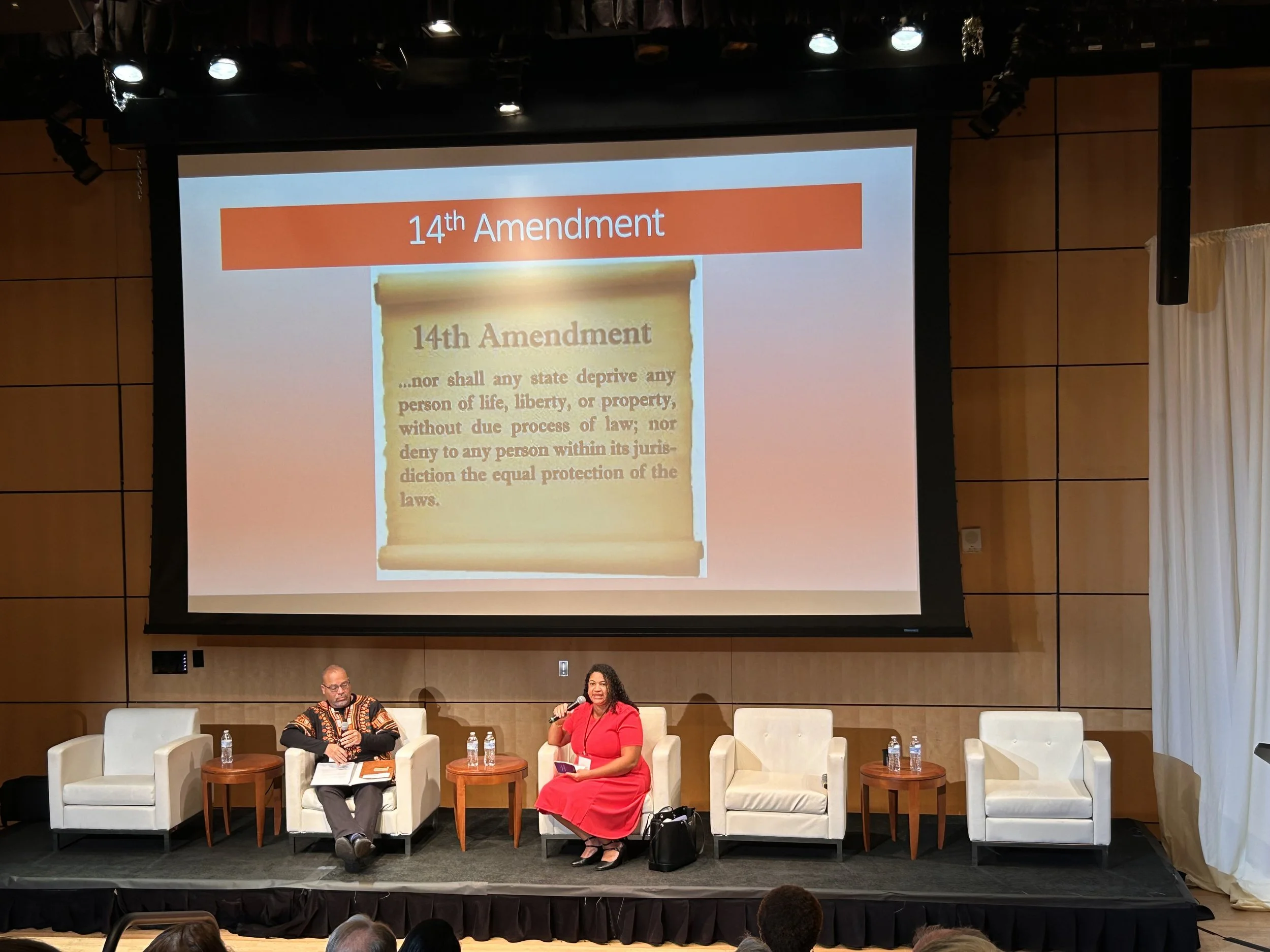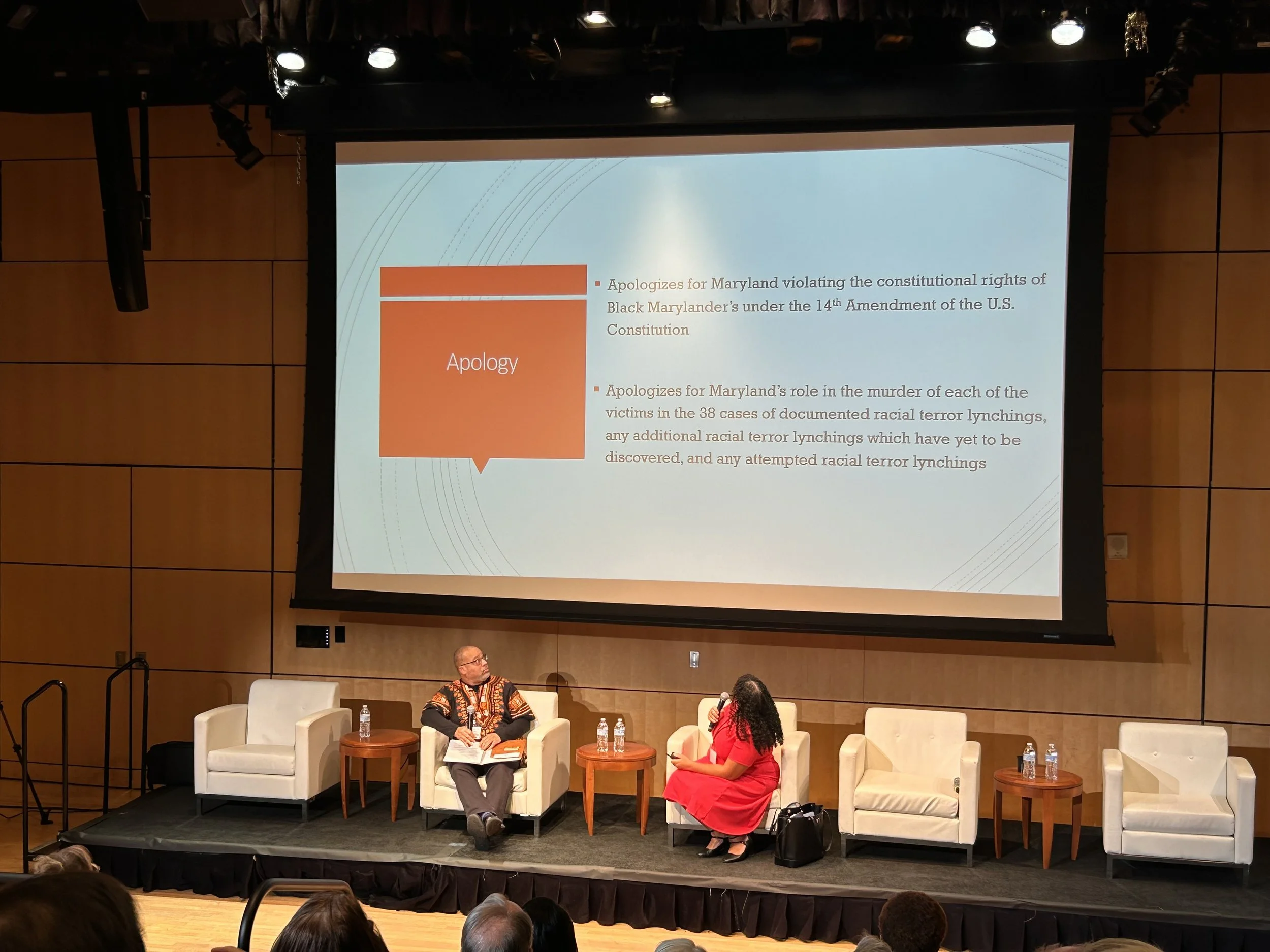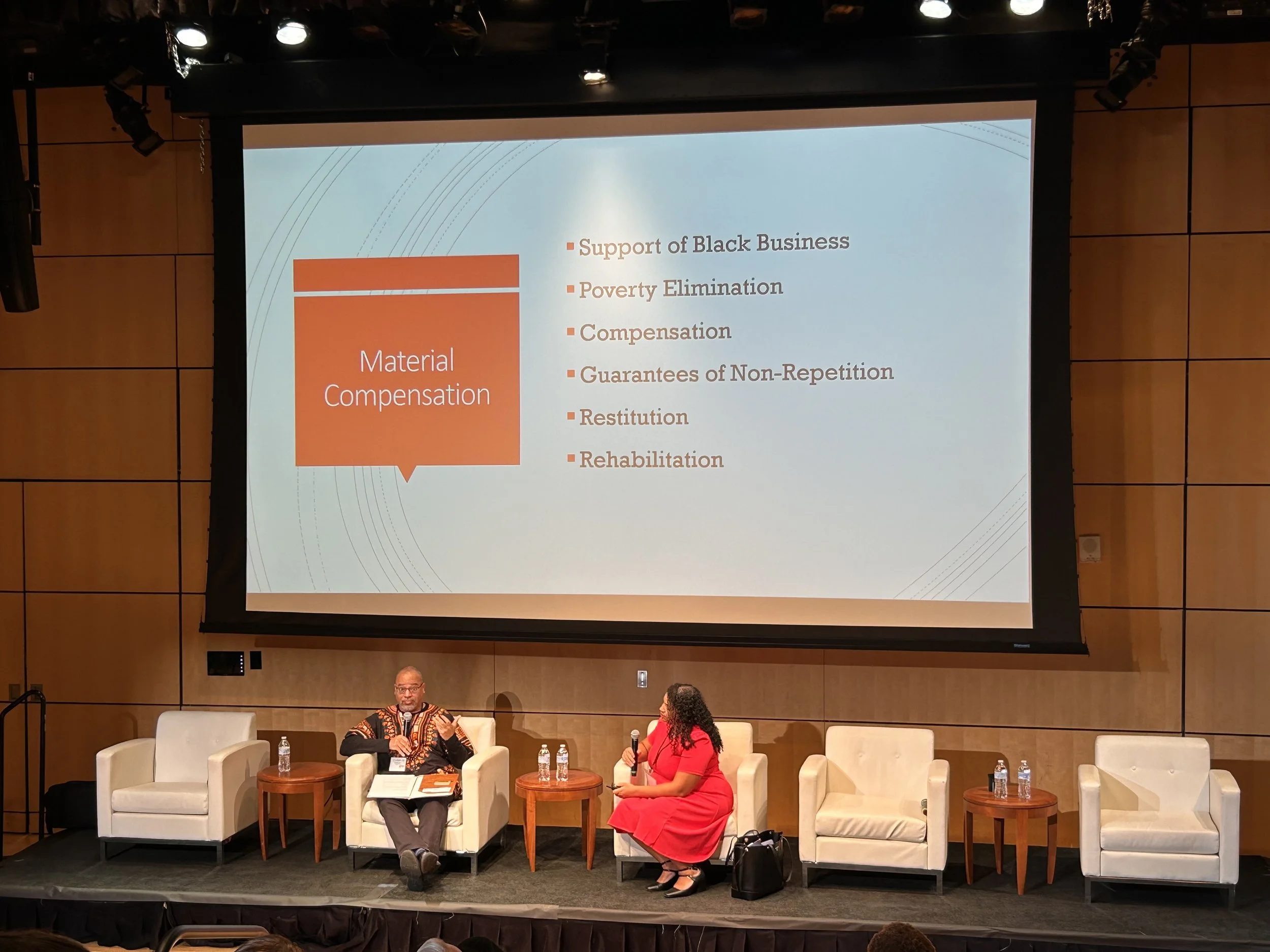Maryland Lynching Truth and Reconciliation Commission’s Commissioners’ release details of recommendations for reform
Baltimore, Maryland —While at the Maryland Lynching Memorial Project’s 8th annual conference, two of the Maryland Lynching Truth and Reconciliation Commission’s commissioners showed attendees, in the form of a slide show, a list of recommendations for a statewide policy to help remedy and repair communities injured by lynchings and racial discrimination.
Dr. Nicholas Creary, who co-wrote House Bill (HB) 307 with Del. Peña-Melnyk, which helped to establish the Maryland Lynching Truth and Reconciliation Commission (MLTRC), and Civil Rights Attorney and author of “Black Was The Ink” Michelle Coles, Esq., told the attendees that there are around 130 recommendations. Creary said the actual report is still in its early stages and that the commission has some “tweaking to do.” However, he maintained that the commission is on schedule to have it ready for the Maryland General Assembly’s viewing on Dec. 1.
“This has been a long, hard-fought process that has benefited from the contributions of so many people all around the state of Maryland,” said Coles on Oct. 25. “We're close to the finish line now.”
The report will be made available to the public after the General Assembly and the governor views the document. However, the MLTRC isn’t able to provide a specific date when the report will be made accessible to the public.
The recommendations come after six years of the commission studying cases of lynchings. During those six years, the commission partnered with county coalitions (which included descendants of those that have been lynched) to hold 14 public hearings. At each meeting, families, historians, and activists, with profound details, retold histories of lynchings.
“I have to say that without the support and collaboration of Maryland Lynching Memorial Project and local coalitions, we would not have gotten anywhere,” said Creary. “And so, I can't begin to thank you all who are here and… scattered across the state for all the work that you did to make this work possible.”
The commission found that, throughout the state, white mobs ( a combination of law enforcement and residents) lynched 38 Black people. This number includes a 13-year-old, 15-year-old, and some 18 year-olds. Dr. Stacey Patton — historian, author of the forthcoming book “Strung Up: The Lynching of Black Children in Jim Crow America,” and media scholar at Howard University’s School of Communication — in general, spoke about the lynching records of children.
“Despite more than a century of scholarship on lynching, children have largely been overlooked or erased,”Patton explained. “Their names have been stripped of context and forgotten. But, their murders were not random.They were strategic acts of racial terror, designed to halt black progress at its source. To kill a child was to murder possibility itself.”
The recommendations aim is to aid in reforming discriminatory practices within the criminal justice system, remove barriers to mental health access, and more. The approximately 130 recommendations are divided into approximately nine categories: apology, material compensation, criminal justice reforms, community healing, education recommendations, mental health recommendations, symbolic recommendations, media recommendations, and implementation.
Coles and Creary said the recommendations start with an apology about Maryland’s complicity in allowing white mobs to carry out extrajudicial killings. Coles, as she has made clear in other settings, said that these acts of racial terror were a violation of the 14th Amendment, which grants rights to those “born or naturalized in the United States citizenship.”
“ Number one: A state is not supposed to make or enforce a law that infringes the privileges or immunities of United States citizens. Number two: No state shall deprive any person of life, liberty, or property without due process of law,” said Coles. Three: No state shall deny to any person within its jurisdiction the equal protection of the laws. Just looking at those three clauses in the 14th Amendment, it's pretty obvious to anyone who reads them how the entire Jim Crow error was a giant constitutional violation.”
She added: “Under the law, when there's a constitutional violation, there should be a remedy. So we started with an apology.”
Creary also discussed the material compensation portion of the recommendations. “ We had some very impassioned conversations within the reconciliation committee, particularly around who should be compensated,” said Creary. You know, some people think compensation should only go to those who are the American descendants of slavery.” Creary did not clarify how the recommendations will be implemented in relation to this issue.
Creary said the committee used transitional justice and human rights principles as a framework. This gave them tools to help them to identify elements that encouraged lynching and racial terror. Transitional justice is a framework used to address societal conflict between groups. It’s about justice to victims injured by injustice. A transitional justice framework is undergirded by the human rights, a notion that says that all humans -- no matter who they are -- have the right to the right to life, liberty, and security. Transitional justice initiatives suggest that reparations (financial, restitution of land, and access to social services) are remedies for healing.
Creary also talked about a “guarantee of non-repetition.” He made it clear that rooting the recommendations within a transitional justice framework is an attempt to dismantle racial oppression in Maryland.
“I think a lot of the recommendations that we're making are aimed at trying to make sure that this doesn't happen again, with that through line of going from slavery to Jim Crow; to the new Jim Crow,” he said. ”That oppression hasn't ended. It's adapted, and we want to make sure that it stops.”
Creary also said that they also offer, within these recommendations, a component that will help the state to protect itself from possible federal interference. He showed evidence of how the Trump administration’s Department of Justice threatened to investigate Buncombe County for offering similar recommendations for reparations to Black people.
“The letter dated Sept. 4 came one day after the Reparations Commission briefed Buncombe commissioners at their regular meeting about its final report,” according to the Asheville Watchdog, a news organization. “The commission was created in March 2022 as part of Asheville’s historic effort to provide reparations for Black residents who had suffered systemic racism across generations.”
Also, citing a law proposed by Texas Congressman Brian Rabin, the No Bailout for Reparations Act, Creary said that the federal government can target Maryland as well for its recommendations for reform and repair.
Creary suggested the state establish an agency. According to Creary, the attorney general's office recommended that the agency be housed within the Department of Social and Economic Mobility. Additionally, Creary said that he hopes the agency has subpoena powers and that it sets aside funding to defend itself from the Trump administration.
Looking towards Coles, Creary said: “At the last commission meeting, you suggested that, [perhaps], within a week or hours of [implementing these recommendations] we're going to get something similar from the attorney general's office. So we need to be prepared, because there's going to be pushback.”
Read Our Other Reporting







